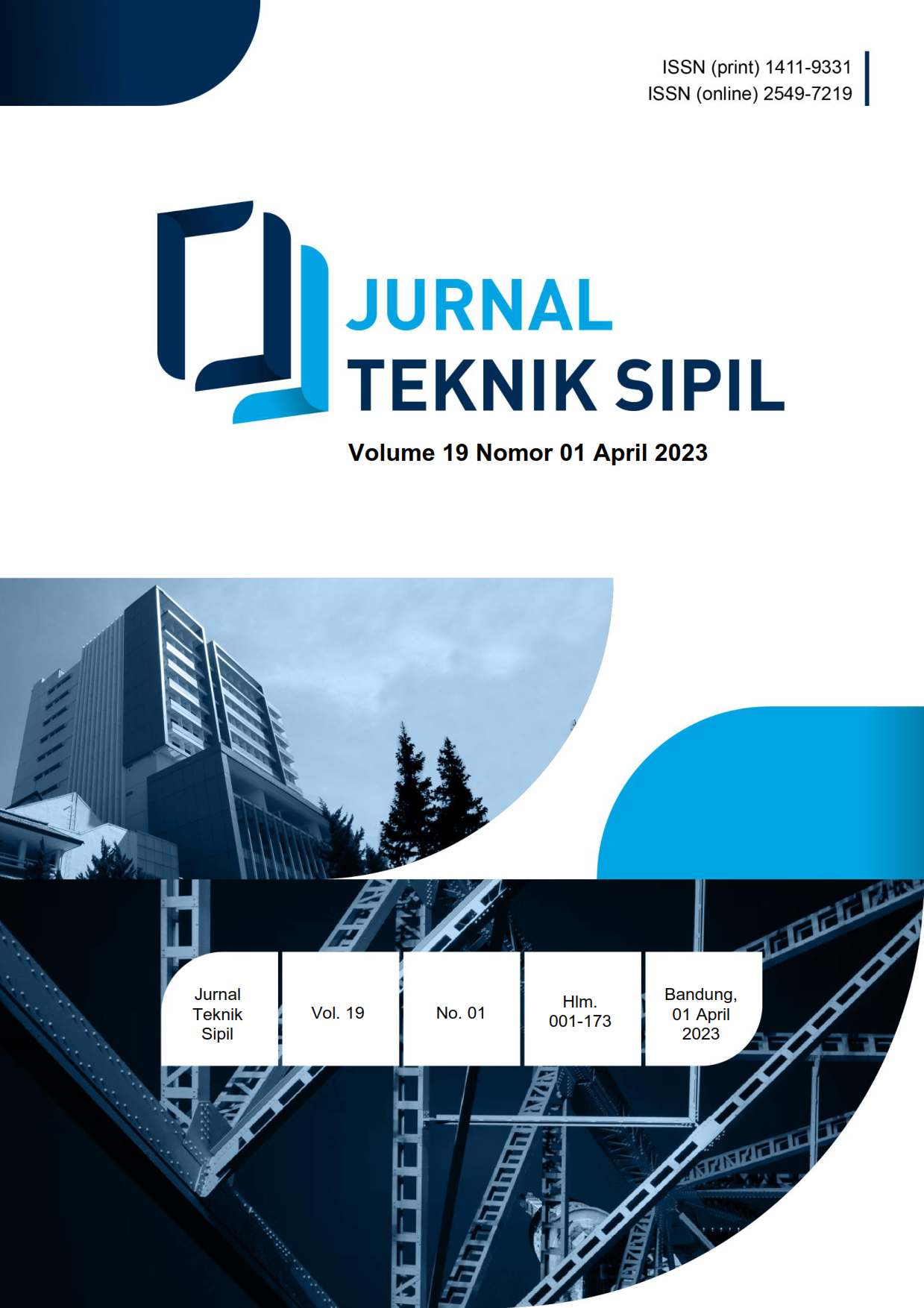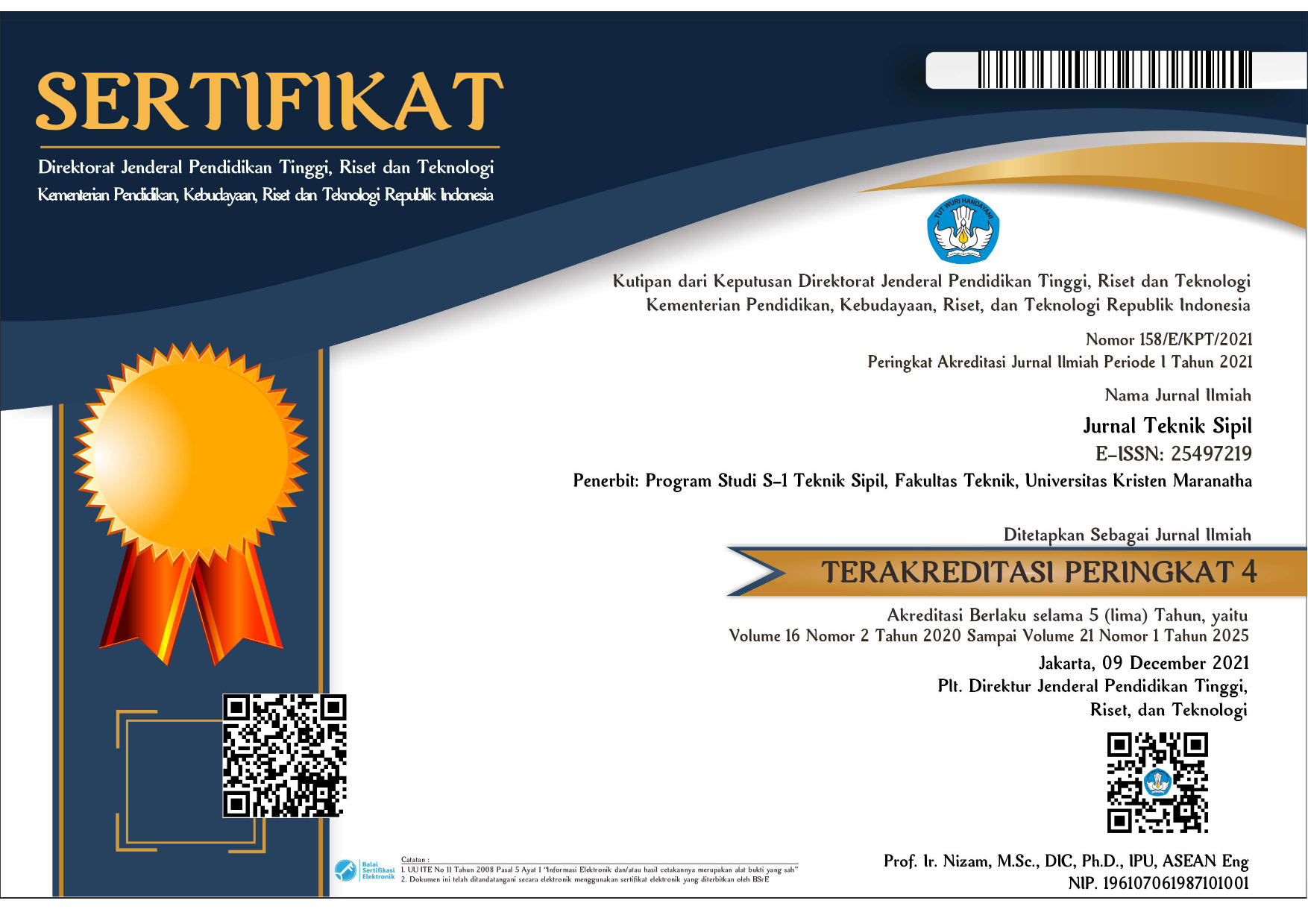The Effect of Paselloreng Dam Construction on Fulfilling Irrigation Water Needs in Gilireng Irrigation Area
DOI:
https://doi.org/10.28932/jts.v19i1.5230Keywords:
Gilireng Irrigation Area, Irrigation, Paselloreng Reservoir, Water BalanceAbstract
The construction of dams has an impact on increasing the availability of water in a certain area. The development of Sidrap Regency and Wajo Regency from year to year has caused the need of water for their residents also increase. The construction of the Paselloreng Multipurpose Dam is expected to meet the water needs, especially during the dry season where the shortage is occurred and the planting intensity is 112%. In connection with the fulfillment of water needs from the constructed reservoir, it is necessary to analyze the water balance so the capability of Paselloreng Dam to fulfill the water needs could be evaluated.. According to the results of the research analysis, it was found that Paselloreng Reservoir can meet irrigation water needs using the rice-paddy-palawija cropping pattern starting early in November-2 to meet the maximum irrigation water requirement of 12.42 m3/s and the minimum requirement of 0.79 m3/s . The simulation results of the operation of the reservoir with the benefits of raw water and irrigation covering an area of 8,510 ha with a planting intensity of 270% for reliability above 80%. The simulation results have not taken into account the additional inflow discharge in the catchment area between the reservoir location and the Gilireng Weir location (water availability downstream of the reservoir). After the existence of a reservoir, the fulfillment of water needs can be fulfilled where before the existence of a reservoir.Downloads
References
Ariyani, D., & Zubaeda, F. (2018). Analisis Neraca Air pada Daerah Irigasi Bendung Barugbug. Kabupaten Karawang.
Badan Pusat Statistik. (2021). Kabupaten Wajo dalam Angka. Kabupaten Wajo.
Badan Pusat Statistik. (2015). Statistik Pertanian Tanaman Pangan Provinsi Sulawesi Selatan. Kabupaten Wajo.
Balai Besar Wilayah Sungai Pompengan Jenebarang. (2017). Laporan Desain Tersier dan PLB Jaringan Irigasi Gilireng. Kabupaten Wajo, Makassar.
Balai Besar Wilayah Sungai Pompengan Jenebarang. (2021). Laporan Pemantauan dan Kajian Operasi dan Pemeliharaan Bendungan Paselloreng. Makassar.
C.D. Soemarto. (1987). Hidrologi Teknik, Usaha Nasional. Surabaya.
Departemen Pekerjaan Umum Direktorat Jendral Pengairan. (1999). Panduan Perencanaan Bendungan Urugan. Departemen Pekerjaan Umum, Jakarta.
Departemen Permukiman dan Prasarana Wilayah. (2004). Pengoperasian waduk tunggal. Nomor : 360/KPTS/M/2004. Jakarta.
Direktorat Jendral SDA. (2013). Standar Perencanaa Irigasi. Jakarta
Fadil, I., & Hariati, F. (2022). Perencanaan Dimensi Kantorng Lumpur pada Intake. 18(L), 262–279. https://doi.org/10.28932/jts.v18i2.4652.
Hatmoko, Waluyo. (2021). Pengantar Perencanaan dan Pengoperasian Waduk. Deepublish, Yogyakarta.
Harmans, F. C. N., Pattiraja, A. H., & Semiun, O. E. (2022). Analisis kebutuhan domestik di kecamatan maulafa terhadap ketersediaan air bersih. 18, 202–215. https://doi.org/10.28932/jts.v18i2.3911
Kodoatie, R.J. dan Sjarief, R. (2010). Tata Ruang Air. Yogyakarta, ANDI Yogyakarta.
Notohadiprawiro, T., Sukodarmodjo, S., & Dradjad, M. (2006). Beberapa Fakta Dan Angka Tentang Lingkungan Fisik Waduk Wonogiri Dan Kepentingannya Sebagai Dasar Pengelolaan. Lokakarya Pengembangan Dan Pelestarian Wilayah Waduk Wonogiri, 1–11.
Rahmawati, F. A., Damayanti, I. S., Suharyanto, & Wulandari, D. A. (2018). Analisis Neraca Air Sistem Irigasi Interkoneksi Kalibawang. Yogyakarta. 140–150.
Sosrodarsono Suyono, Kensaku Takeda. (1984). Bendungan Type Urugan. Pradnya Paramita, Jakarta
Triatmodjo, Bambang. (2008). Hidrologi Terapan. Beta Offset, Yogyakarta.
Downloads
Published
How to Cite
Issue
Section
License
Copyright (c) 2023 Ricky Zefri, Falci Isrami

This work is licensed under a Creative Commons Attribution-NonCommercial 4.0 International License.















